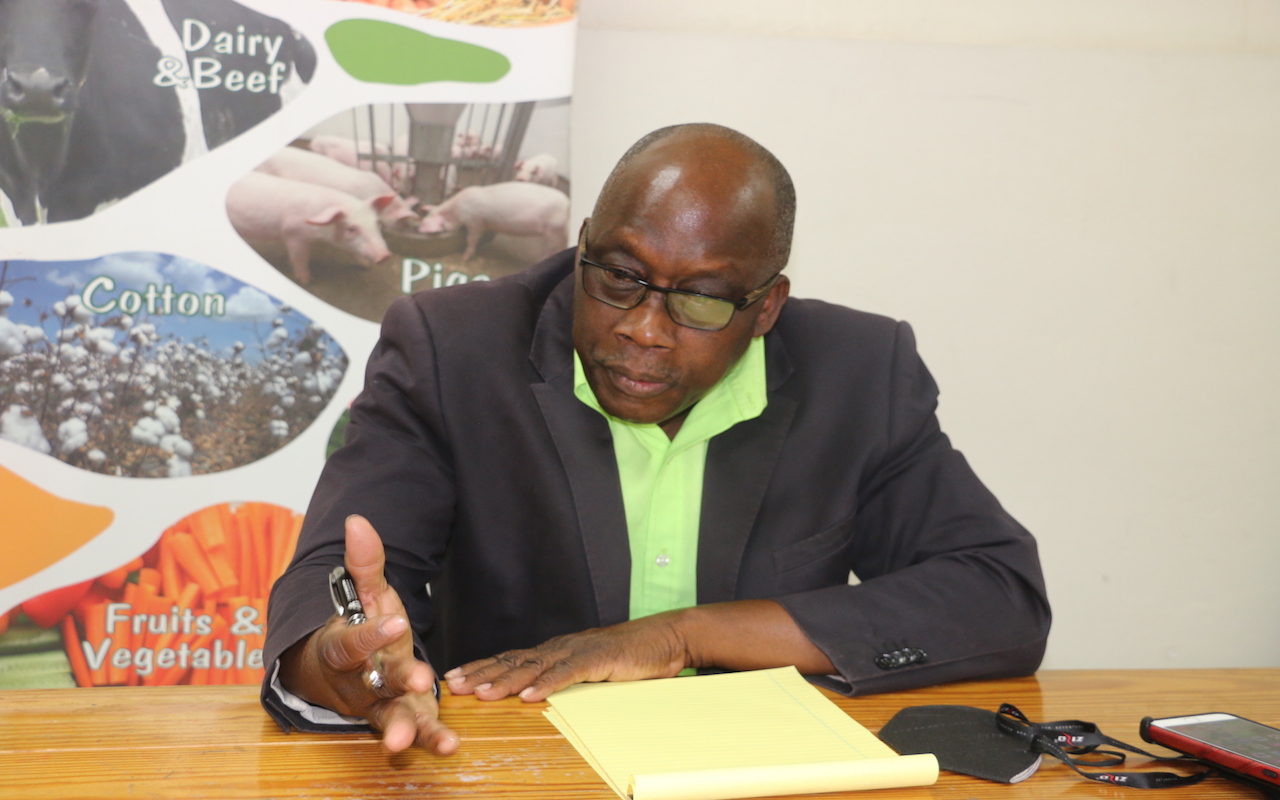The Sheep Farmers Inc. of the Barbados Agricultural Society (BAS) is embarking on a new project to import a breed of sheep that can be crossed with the local Blackbelly variety.
This announcement was made on Wednesday during a press conference at the BAS headquarters, the Grotto, St Michael.
President of the association Maurice Grant said that the indigenous animal was not profitable to farmers and cross breeding the sheep with another one would help improve the genetics and create a superior breed that was bigger and more muscular.
“The Blackbelly sheep is not a very profitable animal for a farmer. While we pride ourselves in the quality of the meat, it really does not make a great deal of sense to the farmer . . . The reason for that is very simple,” he said. “If you kill a Blackbelly sheep . . .it’s the two hind legs that provide you with your leg chops. Beyond that if you are lucky you may get shoulder chops. Outside of that there is nothing else.
“The backs are not broad enough for you to get lamb chops out of the back. In Barbados, the lamb rack of the Blackbelly sheep is not meaty so it is sold mostly as a soup meat as opposed to the very expensive lamb rack that you will see elsewhere.
“So basically when you kill a Blackbelly sheep there is not a lot that you will get out of the meat. And if you price the back legs too high to try to offset that, it probably just wouldn’t sell.”
Grant said sheep farmers could no longer raise the Blackbelly as a primary source of income and decided that it was more lucrative to import a breed that could be crossbred with the Blackbelly.

Maurice Grant
He stressed that it was not ideal to rid Barbados of its indigenous animal and the aim of this project was to establish a crossbreeding programme, in which a farmer could truly benefit from rearing sheep in Barbados.
He said farmers would be rearing both the Blackbelly and the crossbred sheep simultaneously.
He explained that rearing the Blackbelly sheep was costly when labour, utilities, security and feed were considered, and a farmer with 100 Blackbelly sheep could spend from $1 000 to $2 100 monthly on hay and feed during the dry season depending on how much supplemented feed the animals were fed.
Chief executive officer of the BAS James Paul said that in the past efforts were made to crossbreed the Blackbelly sheep to boost the genetics and breeds such as the Wiltshire and Dorset were imported, but those projects failed.
Grant said that a survey was carried out last year to ascertain how many Blackbelly sheep were on the island and it was determined that about 11 000 of the breed were being reared, but there could be as many as 15 000.
About 3 000 people were directly or indirectly involved in the sheep industry, the majority of whom kept the animals for leisure purposes. Additionally, there were 200 BAS-registered farmers.
Grant said BAS officials and the farmers were organising themselves to ascertain how many people were interested in the project, noting that a specific breed had not been identified yet but they were impressed by the genetics of the American Barbados Blackbelly sheep, which is used predominantly for hunting.
He said the Americans crossbred the Blackbelly with another sheep and created a muscular, horned animal with some Blackbelly characteristics, adding that the farmers were doing research to find out what the Blackbelly was crossbred with as they would like to replicate that process.
Paul said a lot of research and commitment would be needed to undertake a project of this magnitude. He suggested that the University of the West Indies, Cave Hill campus play a more critical role in research issues in the agriculture sector.
Grant added that this project would further develop the sheep industry which was plagued by a number of issues that include: interbreeding; lack of proper pen and security infrastructure; inadequate land space; limited access to bales and high production costs.
He added that this project was in no way intended to run contrary to the Barbados/Guyana Blackbelly sheep initiative, noting that there was a lot of uncertainty where that project was concerned and farmers were a bit uncertain in signing up for the arrangement.
Grant said that farmers were in the dark as it relates to the mechanics of how that project would work, adding that they were unsure of the transportation cost to ship the sheep to Guyana and the quality of grass there.
He said that word on the ground was that the project was not likely to start in the next two years and the 60 000 acres being offered to rear the sheep was off the Guyana/Brazil highway.
He said it took about an hour and a half on a flight from Georgetown to the savannah where the project is to be set up, noting that infrastructural work would have to be done before the project started.
It was for those reasons, he said, that his organisation could not make recommendations to the farmers for them to make a decision about that project.
sheriabrathwaite@barbadostoday.bb




